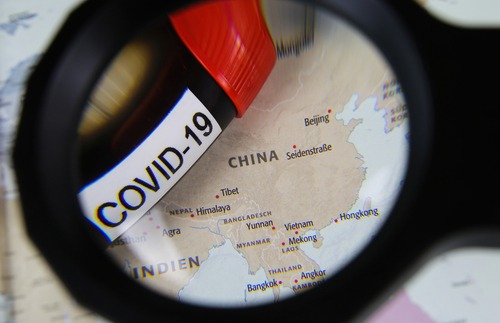
A congressional panel began the formal process of investigating the origins of Covid-19 Wednesday amid recriminations over allegations of researchers being intentionally misled by the Chinese government and American media and politicians.
U.S. Rep. Michael Waltz (R-FL) labeled it “a bit outrageous” that Wednesday’s session before the U.S. House Science, Space, and Technology Subcommittee on Investigations and Oversight was the first congressional hearing into the origins of the 18-month pandemic, despite millions of illnesses, hundreds of thousands of deaths, billions in costs, and major disruptions to commerce and schools in the United States and all over the world.
“Let’s get started,” Waltz told his fellow lawmakers and a panel of medical experts who were appearing.
Republicans on the panel expressed anger at some of their Democrat colleagues, as well as social media and portions of the public who dismissed claims the virus may have been created in a laboratory in China, then leaked out. They railed at a February 2020 letter published in the British journal Lancet signed by 27 prominent public health scientists deriding such theories as “rumors” and “misinformation,” saying that stance slowed development of treatments and understanding of the virus.
“I think it screams for more global coordination and pressure, frankly,” said U.S. Rep. Anthony Gonzalez (R-OH), of the study of the origin.
Dr. Stanley Perlman, professor of microbiology and immunology at University of Iowa and one of the signees of the letter, agreed with Gonzalez, saying, “There’s no question that even in the beginning, there was somewhat of a cover-up (by the Chinese government). Something that has to change.” He conceded the Lancet letter had a negative impact on the investigations of the origin of Covid-19. “The letter did have a chilling effect on the discussion of origin,” said Perlman. “Every time, we as scientists, make these statements we need to be clear.”
“How do we prevent this from happening next time,” asked U.S. Rep. Jay Obernolte (R-CA). “I think everyone can agree this was not helpful.”
But Perlman, who has researched coronaviruses for more than 40 years, said it was allegations and innuendo that the Chinese were involved in some kind of conspiracy to create and/or spread the virus that the scientists objected to and not the notion that the virus may have accidentally leaked from the lab, the Wuhan Institute of Virology.
U.S. Rep. Bill Foster (D-IL), chairman of the subcommittee, agreed that China has been less forthcoming with facts surrounding the first outbreaks of the virus. “It’s not in dispute that the Chinese government has withheld facts,” said Foster. He said China’s lack of transparency has created “serious geopolitical concern.”
Dr. David Relman, professor at the Stanford University School of Medicine, said there is valid reasons for suspecting the Wuhan lab origin theory. He noted that some of the work at the lab was “particularly risky,” including the reproduction of unknown viruses. “Some of the work does deserve special attention,” said Relman, senior fellow at Stanford’s Center for International Security and Cooperation and one of four experts testifying at the hearing.
Rep. Obernolte said the task of finding the virus origins has been harmed by the politicization of the Wuhan lab theory, noting that some social media sites have barred even mention of the theory, preventing scientific inquiry.
Relman said neither theory, that the virus was inadvertently developed in the Wuhan lab or that it was passed from animals like bats, can be definitively proven yet. “Neither hypothesis can be ruled in or ruled out,” he asserted. “Both are plausible.” He called on Congress to develop its own plan now to investigate the origins of the virus.
Relman said he would like to see the U.S. government spur discussions on whether there needs to be international norms on research and development of such biomaterials and further discussions on non-proliferation by both nation-states and non-nation players. He noted there are no regulations governing such research.
U.S. Rep. Don Beyer (D-VA) suggested the creation of an international body to track and study small outbreaks of viruses, and not just the big ones.
Some of the discussion focused on how to get the Chinese, who have been criticized for not cooperating with the World Health Organization on its Covid-19 investigation, to open up to additional efforts. “How do we move forward in investigating the origins of Covid without the cooperation of China,” asked U.S. Rep. Frank Lucas (R-OK).
Dr. Suzan Murray, program director of the Smithsonian Global Health Program at the Smithsonian National Zoo & Conservation Biology Institute, said research partners need to be incentivized in order to cooperate with investigations. “If you help out you get something for it,” she said.
“At the end of the day the host country needs to collaborate,” said Dr. Connie Price, professor of medicine at the University of Colorado School of Medicine’s Division of Infectious Diseases. Any investigation, she said, needs to respect that when a host country invites outsiders into their country or labs “it is their data. You are there in the capacity of a consultant. You need their people there to work beside you.”
Stanford’s Relman said the relationship of scientists established prior to investigations or specific projects goes a long way to creating the proper atmosphere for cooperation.
He cited the need of transparency in all circumstances, “not just China or the U.S., but the whole world,” in effecting successful investigations, like the Covid-19 origins probe.
Price said any successful investigation is going to rely heavily on the cooperation of the host country, in this case China. “At the end of the day the host country needs to collaborate,” she said. “You have to deal with their concerns of the negative impacts of their cooperation.”




